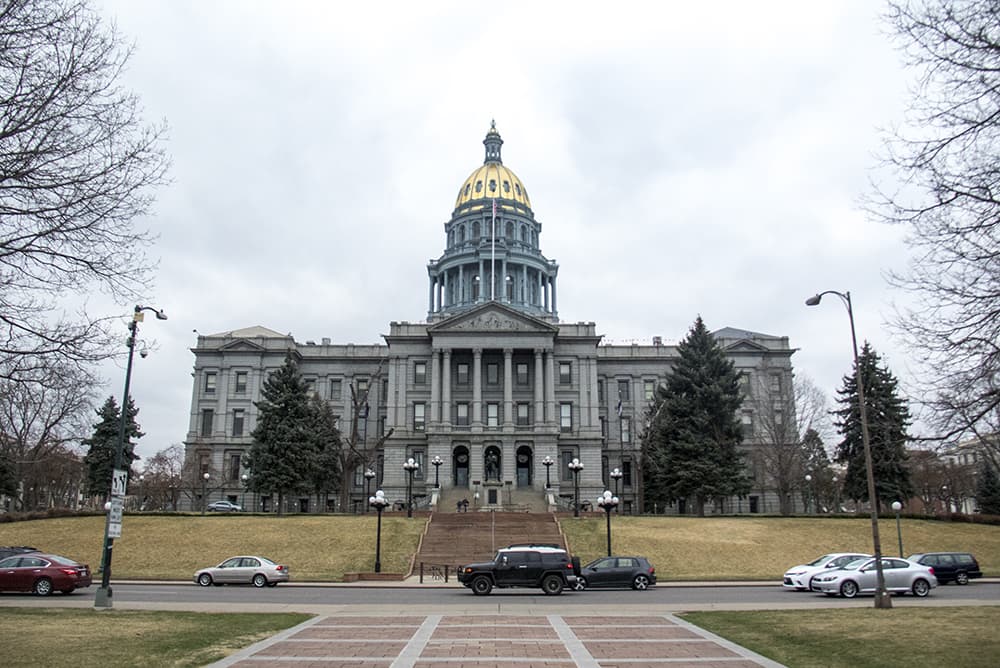The grand bargain that's being called the most important piece of legislation this year got initial approval from the House of Representatives a little after 1 a.m. Tuesday, the end of a marathon day that began with final approval in the Senate Monday morning, followed by a race through two House committees to get to the floor of that chamber.
Once there, Republicans offered up a seemingly endless stream of amendments. Some of these amendments got to the heart of the disagreement over the bill, like one that would have reduced the revenue cap that applies to the budget by $597 million, instead of the $200 million that is in the bill, or various amendments that would have allowed the voters to have a crack at the complex legislation.
And others would have allowed sea planes to land in Colorado lakes and legalized the sale and purchase of high-capacity magazines in rural counties. After all, if the bill is for the "Sustainability of Rural Colorado" and includes everything from business personal property tax exemptions to a $1.8 billion roads funding package to higher pot taxes to a major change in the state budget, doesn't anything go?
(Republicans have wanted to repeal the high-capacity magazine limit since it was enacted in 2013 in the aftermath of the Aurora theater shooting. A bill with bipartisan support to allow sea planes to land on Colorado lakes was defeated last month. Neither was included in the final bill.)
Early Tuesday morning, after the House had adjourned and reconvened, with a new pledge of allegiance and roll call for the new day, Democrats managed to cut off debate on amendments and quickly held the voice vote needed to advance the bill to a final vote. The session ends on Wednesday, so time is short.
State Sen. Jerry Sonnenberg said the Republican and Democratic sponsors of SB17-267 made a promise as the bill headed to their respective chambers: No amendments. The bill took weeks of negotiations to hammer out and had already been re-written extensively.
The bill:
- Reclassifies the hospital provider fee into an enterprise fund. This separates it from the rest of the budget and protects hospital funding in this year and in the future. It also frees up hundreds of millions of dollars in the rest of the budget.
- Reduces the revenue cap that governs the rest of the budget by $200 million. This is the trade-off for putting the fee into an enterprise, but it's a much smaller reduction than many Republicans wanted.
- Funds a $1.8 billion roads program and a $120 million capital construction program by selling certificates of participation on state property. This is a debt mechanism that doesn't require voter approval, and it obligates the state to pay $100 million in general fund money and $50 million in Highway User Tax Fund money to pay off that debt.
- Requires state departments to submit budget requests next year that are 2 percent smaller than this year.
- Raises marijuana retail sales taxes to the maximum 15 percent authorized by voters.
- Increases Medicaid co-pays for some patients.
- Dedicates $30 million for rural schools and an additional $29 million from marijuana tax money for the education fund.
- Increases the business personal property tax exemption to $18,000.
- Protects the senior homestead tax exemption and lets it be used as the first refund in years when the state owes taxpayers a refund under TABOR.
That's not even everything. We looked at what the bill would do and the fight around it here and here.
The Senate passed the bill by a vote of 25-10, with eight Republicans voting yes.
Sonnenberg called it "one of the finest experiences of my legislative career" to work with Senate Minority Leader Lucia Guzman, a Denver Democrat, House Majority Leader K.C. Becker, a Boulder Democrat, as well as Rep. John Becker, a Republican from Brush, on the complicated bill.
Sonnenberg's district was facing the potential closure of two hospitals if the fee were not reclassified and the funding restored.
Some members of his own party said the bill raises constitutional issues and represents an end-run around TABOR by freeing up millions of dollars under the revenue cap by segregating money from a "fee" that is really a tax.
"That's some convenient math for politicians who want to increase taxes and spend more money without going to the voters," said Sen. Tim Neville, a Littleton Republican.
Sonnenberg countered that "the biggest back door to TABOR is our budget." Legislators were willing to cut money to hospitals to avoid writing refund checks to taxpayers. Under this bill, the revenue cap comes down $200 million -- a lot less than the amount of capacity the fee program was taking up in the budget but less than nothing -- and departments have to issue budget requests next year that are 2 percent smaller than this year.
"When we add another dollar in fees to our government, we cut two from our hospitals," Sonnenberg said. "When we add funding for another state employee, we cut funding for two from hospitals, all so we don't have to write a check to taxpayers. This needs to stop. This removes one shell from the game."
In the House, Rep. John Becker said the bill forces the state to prioritize roads spending out of existing revenue rather than going to the voters for a tax increase, something Republicans have wanted, perhaps as badly as Democrats have wanted to reclassify the provider fee.
"That is putting skin in the game for transportation," Becker said. "That is the stuff we've been asking for."
This story has been updated throughout to reflect developing news.














